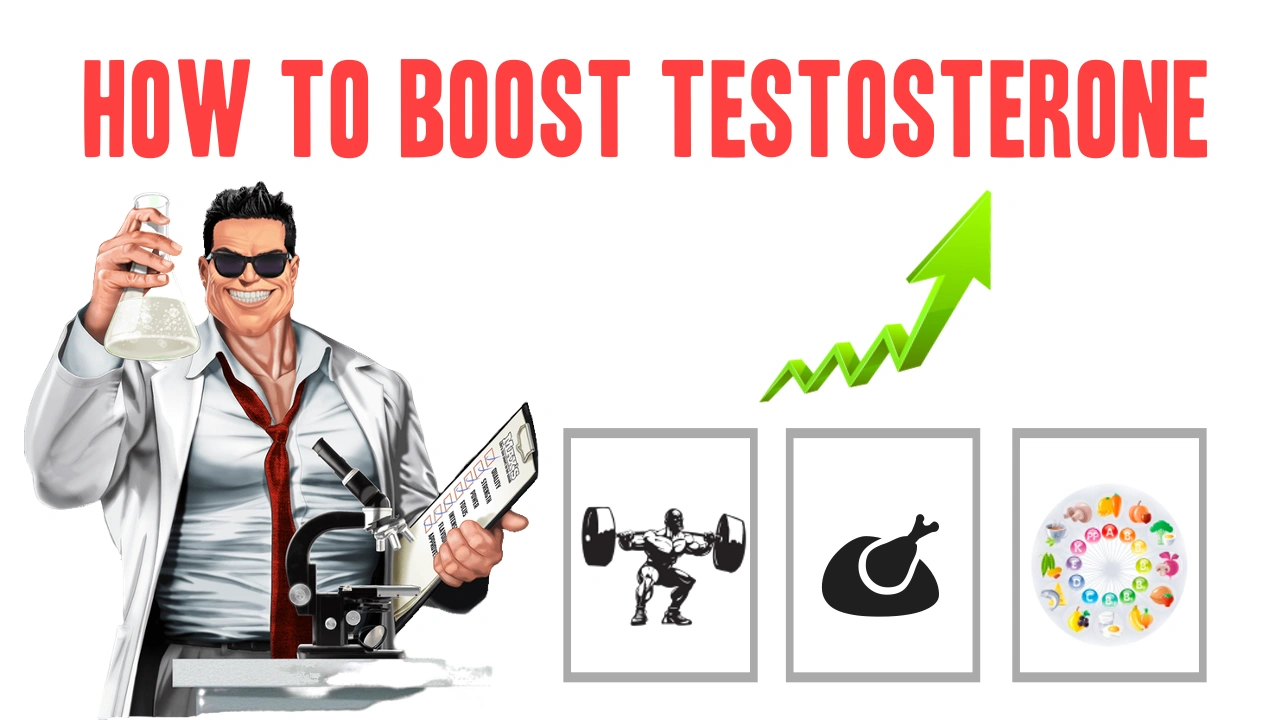Contents
What Is Testosterone?
Testosterone is a steroid hormone primarily produced in the testes in men and in smaller amounts in the ovaries and adrenal glands in women. It belongs to the androgen group of hormones and plays a crucial role in regulating:
- Muscle mass and strength
- Fat distribution
- Bone density
- Mood and cognitive function
- Sexual development and libido
Although it’s most commonly associated with male health, testosterone is important in both sexes for maintaining metabolic health, mental sharpness, and physical vitality.
Functions of Testosterone in Fitness and Health
1. Muscle Growth and Protein Synthesis
Testosterone enhances muscle hypertrophy by increasing muscle protein synthesis and activating satellite cells, which are essential for muscle repair and growth following resistance training (Herbst & Bhasin, 2004). Higher testosterone levels are associated with greater gains in lean body mass and strength.
2. Fat Distribution and Metabolism
Low testosterone can contribute to increased body fat, especially visceral fat. Studies have shown that testosterone therapy in deficient men can lead to reduced fat mass and improved insulin sensitivity (Grossmann et al., 2018).
3. Libido and Sexual Health
Testosterone is a key regulator of sexual desire, erectile function, and overall reproductive health. Low levels can reduce libido, impact fertility, and cause fatigue.
4. Cognitive Performance and Mood
Optimal testosterone levels are associated with better memory, focus, and emotional stability. Low testosterone is linked with symptoms of depression, irritability, and brain fog (Zarrouf et al., 2009).
5. Bone Health
Testosterone helps maintain bone mineral density, reducing the risk of fractures and osteoporosis, particularly as men age.
Signs and Symptoms of Low Testosterone (Hypogonadism)
Symptoms can vary by age but may include:
- Reduced muscle mass and strength
- Increased body fat (especially around the abdomen)
- Low libido or erectile dysfunction
- Chronic fatigue or low energy
- Depressed mood or irritability
- Difficulty concentrating
- Decreased bone density
A blood test measuring total and free testosterone levels is the primary method for diagnosing low testosterone.
What Causes Testosterone Deficiency?
Common factors include:
- Aging (natural decline begins around age 30)
- Chronic illnesses (e.g., diabetes, obesity, liver or kidney disease)
- Medications (e.g., corticosteroids, opioids)
- Stress and sleep deprivation
- Pituitary gland disorders
- Testicular injury or surgery
How to Naturally Boost Testosterone Levels
1. Strength Training and HIIT
Strength training, especially compound movements like squats and deadlifts, can significantly boost testosterone. High-intensity interval training (HIIT) also increases hormone output.
2. Sleep Optimization
Aim for 7–9 hours of quality sleep per night. Testosterone is produced during deep sleep stages; chronic sleep loss can reduce levels by up to 15% (Leproult & Van Cauter, 2011).
3. Healthy Fats and Balanced Diet
Diets rich in monounsaturated and saturated fats, along with adequate protein and micronutrients (zinc, vitamin D), support hormone production. Avoid extreme caloric deficits and processed foods.
Best Foods to Include in a Testosterone-Supporting Diet
| Food | Key Nutrients | Benefit |
|---|---|---|
| Oysters | Zinc | Supports testosterone synthesis |
| Eggs | Vitamin D, cholesterol | Hormone precursor |
| Fatty fish (salmon, mackerel) | Omega-3s, vitamin D | Anti-inflammatory, supports T |
| Leafy greens (spinach, kale) | Magnesium | Supports free testosterone |
| Olive oil | Monounsaturated fats | Linked to higher testosterone |
| Avocados | Healthy fats, vitamin E | Hormone balance and antioxidant |
| Brazil nuts (moderation) | Selenium | Supports sperm health and testosterone |
4. Stress Management
Chronic stress increases cortisol, which suppresses testosterone. Mindfulness, meditation, and balanced training loads help mitigate this.
5. Weight Management
Obesity is strongly linked with lower testosterone levels due to increased aromatase activity (converting testosterone to estrogen). Losing fat can naturally restore hormonal balance.
Medical Treatment Options
In cases of clinical hypogonadism, physicians may prescribe:
- Testosterone Replacement Therapy (TRT) via injections, gels, or patches
- Clomiphene citrate or hCG to stimulate endogenous production
- Lifestyle interventions in conjunction with medical therapy
TRT should be guided by a licensed healthcare provider and regularly monitored for cardiovascular, prostate, and hematocrit risks.
Testosterone Myths Debunked
Testosterone causes aggression.
There is little evidence that physiological levels of testosterone cause aggression in healthy individuals. The myth likely stems from abuse of anabolic steroids, which involve supraphysiological doses.
Only men need testosterone.
Women also require testosterone for libido, bone health, and mental clarity, though in lower amounts than men.
High testosterone equals better performance always.
Extremely high levels from external sources can lead to health problems, including infertility, liver dysfunction, and heart disease.
Conclusion
Testosterone is a vital hormone for overall fitness, strength, metabolism, and mental well-being in both men and women. Understanding its role, recognizing signs of imbalance, and taking proactive steps to maintain healthy levels—through lifestyle, nutrition, or medical support—can significantly enhance quality of life and athletic performance.
Scientific References
- Herbst, K. L., & Bhasin, S. (2004). Testosterone action on skeletal muscle. Current Opinion in Clinical Nutrition & Metabolic Care, 7(3), 271–277.
- Grossmann, M., et al. (2018). Testosterone therapy in men with metabolic syndrome and type 2 diabetes. Diabetes Obesity and Metabolism, 20(1), 2–15.
- Zarrouf, F. A., et al. (2009). Testosterone and depression: Systematic review and meta-analysis. Journal of Psychiatric Practice, 15(4), 289–305.
- Leproult, R., & Van Cauter, E. (2011). Effect of 1 week of sleep restriction on testosterone levels in young healthy men. JAMA, 305(21), 2173–2174.
- Vesper, H. W., & Bhasin, S. (2021). Testosterone measurement in the clinical laboratory. Endocrinology and Metabolism Clinics, 50(3), 487–499.



